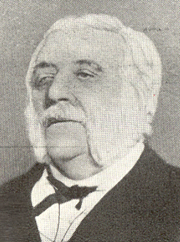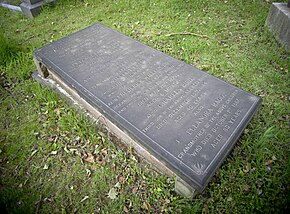| Revision as of 01:11, 7 March 2024 edit217.39.246.114 (talk) →Death: Improved captionTags: Mobile edit Mobile web edit← Previous edit | Revision as of 01:12, 7 March 2024 edit undo217.39.246.114 (talk) →Personal life: Improved linkTags: Mobile edit Mobile web editNext edit → | ||
| Line 58: | Line 58: | ||
| His son, ], continued the work of his father. Bird junior went on to invent egg substitute powder in 1890, ] powder and jelly powder. | His son, ], continued the work of his father. Bird junior went on to invent egg substitute powder in 1890, ] powder and jelly powder. | ||
| ] in Digbeth, Birmingham, is now a centre providing space to artists. | |||
| == See also == | == See also == | ||
Revision as of 01:12, 7 March 2024
English food manufacturer and chemist For the baronet, see Sir Alfred Bird, 1st Baronet.
| Alfred Bird | |
|---|---|
 | |
| Born | 1811 (1811) Nympsfield, Gloucestershire, England |
| Died | (1878-12-15)15 December 1878 Kings Norton, Birmingham, England |
| Resting place | Key Hill Cemetery, Birmingham, England |
| Nationality | British |
| Known for | Inventing egg-free custard and baking powder |
| Children | Son: Alfred Frederick Bird |
Alfred Bird (1811 – 15 December 1878) was an English food manufacturer and chemist. He was born in Nympsfield, Gloucestershire, England in 1811 and was later a pupil at King Edward's School, Birmingham. He was the inventor of a series of food products, most notably egg-free custard and baking powder. His father was a lecturer in astronomy at Eton College. His son Alfred Frederick Bird continued to develop the business after his father's death.
Career
Alfred Bird registered as a pharmacist in Birmingham in 1842, having served an apprenticeship to Phillip Harris of that city. He was a qualified chemist and druggist and went on to open an experimental chemist's shop in Bull Street.
Alfred Bird's first major invention was egg-free custard in 1837. Alfred Bird used cornflour instead of egg to create an imitation of egg custard. It was originally intended only for his wife Elizabeth who had both egg and yeast allergies. The Birds used genuine custard when entertaining guests, but on one occasion the egg-free custard was (either by accident or design) fed to dinner guests. It was well received, and Alfred Bird realised that his invention had a wider use. Soon afterwards Alfred Bird founded 'Alfred Bird and Sons Ltd', which would go on to become the famous Bird's Custard company and brand.
Bird was not content to revolutionise custard but went on to invent a baking powder in 1843 so he could make yeast-free bread for his wife. This formula for baking powder is essentially the same as used in modern baking powders.
Death

Alfred Bird died on 15 December 1878 in Kings Norton, Birmingham and is buried at Key Hill Cemetery in Birmingham. Famously his obituary in the journal of the Chemical Society (of which he was a fellow) discussed at length his skills and research but did not mention his other activity – the by then famous Bird's Custard and Bird's Jelly. It read:
Mr. ALFRED BIRD was born in 1811, his father, Mr. John Bird, being lecturer on astronomy at Eton College. In addition to practising as an analytical and consulting chemist at Birmingham, he devoted considerable attention to physics and meteorology. In the course of his investigations into the laws of sound, he constructed a beautiful set of harmonized glass bowls, extending over five octaves, which he used to play with much skill. In meteorology he devised a plan of demonstrating experimentally that the wind blows in circles. He also, in 1859, constructed a water barometer, a description of which is published in the Phil. Mag. for 1865, and which is still in perfect working order. With this he was fond of observing and showing to others the minute oscillations of the atmospheric pressure. He was well known for his originality and as the inventor of several useful appliances.
Personal life
His son, Alfred Frederick Bird, continued the work of his father. Bird junior went on to invent egg substitute powder in 1890, blancmange powder and jelly powder.
The Custard Factory in Digbeth, Birmingham, is now a centre providing space to artists.
See also
- August Oetker, German populariser of baking powder in 1891
- Henry Jones, a Bristol baker who patented self-raising flour in 1845, as a means of providing fresh bread on ships.
References
- 1851 England Census Class: HO107; Piece: 2049; Folio: 84; Page: 1; GSU roll: 87459
- 1861 England Census Class: RG9; Piece: 2143; Folio: 60; Page: 24; GSU roll: 542924
- Baptised 25 August 1811 in Nympsfield, Gloucester, England. Parents John and Mary. International Genealogical Index batch C030651; source call no. 0425482; Printout call no. 6911781
- ^ "Alfred Bird: Egg-free custard inventor and chemist". Birmingham Mail. Retrieved 25 February 2018
- ^ Gladstone (1879). "Anniversary meeting, March 31st, 1879". Journal of the Chemical Society, Transactions. 35: 257. doi:10.1039/ct8793500257.
- ^ Carey, John (1997). Eyewitness to Science. Harvard University Press. p. 173. ISBN 9780674287556.